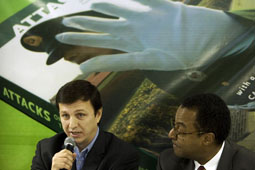The border city of Tijuana, where drug-related violence left almost a thousand people dead in 2008, has had a strong military presence since the government of President Felipe Calderón deployed the Mexican army to fight powerful drug cartels. It can be felt in the streets. While we were driving to the Zeta offices, where we would launch our book yesterday, two Humvees packed with heavily armed military personnel passed us on
I arrived with Chicago Tribune columnist and CPJ board member Clarence Page at the offices at 11:30 a.m. Zeta, a Tijuana-based weekly newsmagazine, had worked through every detail to organize a press conference for the launch of Attacks on the Press. A team headed by Leticia Garza and Claudia Kennedy had set up a podium in the middle of the newsroom featuring CPJ’s logo and a big image of the book’s cover.
In my last visit to Tijuana, in 2004 with CPJ Executive Director Joel Simon, we investigated the murder of Zeta editor Francisco Ortiz Franco, who was gunned down in broad daylight in front of his two children by hit men working for the Arellano Félix drug cartel. We met with J. Jesús Blancornelas, the founder of the newsmagazine and one of the most courageous journalists I have ever met. Blancornelas, still shocked by the murder of his friend and colleague, told us that despite the price the magazine’s staff had paid for their investigative work on drug trafficking, they would not give up. Blancornelas died of natural causes in November 2006.
While journalists arrived for the press conference, we waited in a small conference room where Zeta‘s top editors meet to discuss the magazine’s news coverage. The room, which overlooks the street, has bulletproof walls and windows. A phrase engraved into one of the wall reads: “It is better to miss a story than to lose our credibility.”
According to CPJ 2007 International Press Freedom Award recipient Adela Navarro Bello, Zeta‘s editor, 57 reporters–including cameramen and photographers–representing 41 media outlets were present at the press conference. The room was crammed with journalists, cameras, and tape recorders. Seven television networks, including the Mexican national networks Televisa and TV Azteca, the Miami-based Telemundo, KPBS from San Diego, and a number of Tijuana-based TV stations were there. Also present were reporters from The
Navarro did a brief introduction, expressing gratitude to CPJ for having selected Zeta and Tijuana as one of the cities for Attacks‘ global launch. She urged congressional leaders to promptly debate and approve a bill that will federalize crimes against freedom of expression, which is now under consideration by the Justice Committee of the Chamber of Deputies.
Clarence Page gave a general overview of the book and talked about the deterioration of conditions for the press in Mexico in the last four years. When it was my turn, I took the opportunity to express CPJ’s solidarity with all Mexican journalists, especially those who work under threat of violence while covering dangerous assignments. Journalists were curious hy Mexico has become so dangerous for the media, and how the country ranked in the Americas and the rest of the world. CPJ research showed that 24 journalists have been killed there since 2000, at least eight in direct reprisal for their work. Additionally, seven journalists have disappeared since 2005.
There were quite a few questions related to the emergence of online journalism and the jailing of reporters who work for online publications and blogs. Reporters also asked about protection for freelance journalists, who are more vulnerable to attacks in Mexico without than those who work for established news organizations. They expressed concern about the complicity between criminal organizations and Mexican officials, and how that affects investigations of violence against journalists. There was also criticism of the federal prosecutor who investigates crimes against the press, who played down the severity of the situation during a recent press conference in Mexico City.
Read Clarence Page’s entry on the event, “Reporting in a free-fire zone,” on his blog at the Chicago Tribune‘s Web site.
